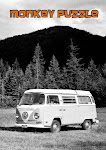I just finished reading Searching for the Secret River and The Secret River, both by Kate Grenville. Both of which are devouringly captivating and difficult if not impossible to get in the US. You'll have more luck getting your hands on the latter, a work of historic fiction, than the former, a memoir of the writing of the novel--unless you have a trip planned to the land of Oz anytime soon.
So, if you're not as lucky as me, AND you don't know the right gypsies who have migrated from England to the US to Australia and back to England who happened to pick up a copy of said text along the way, OR if you're just the kind of person who only reads summaries and cliffs notes, OR if you're in a hurry and need a helping hand or a hint of inspiration, OR if you just want to know what I'm thinking (which for the sake of imposed-modesty as not to distance you from my moment of sarcastic pomposity, "but you probably don't want to know what I'M thinking" [NOTE: she said with a soft sigh and curl of her lower lip, her eyes folding into the circles beneath them])...
I've included the greatest lessons, at least for me, that I've gleaned from reading Ms. Grenville's story of her story.
1. Experience your characters.
“I could experience the past-as if it were happening here and now.” (p. 47)
2. Allow your research to live (by experiencing as human/sensorial).
3. Visualize.
“…what did they wear?...Did the sitters make a pet of the new baby, carrying him on their hips, arguing about swhose turn it was to push in the pram? Did they have prams?...were they the other kind of big sisters,the secretive hair-pulling and ear-pinching kind?” (p.34)
4. Take your time.
5. Be humble. And learn from your process.
“This process was teaching me to be more humble. So far I’d found nothing that was absolutely certain.” (p. 38)
6. Let the story tell its story.
7. Sometimes, but not always follow logic.
“The logical place was to start at the beginning. “ (p. 31)
8. Question your source.
“Was there so much history in Britain that it could be treated casually?” (p. 50/51)
9. Acknowledge your differences (from your story/characters).
“It [aboriginal culture] was so foreign. It took a long time to realise that that was an appropriate feeling. I was an outsider. This wasn’t knowledge you could expect to go to a beak and learn. The thing was to recognise that I didn’t know.” (p. 129)
10. See your experiences as your characters would.
“A few steps into the bush and I’d panicked…not a moral shortcoming, but an interesting thing to know. Wiseman didn’t have the track…He had a whole continent…around him, and those birds that made the place sound so very empty.” (p. 137)
11. Develop a few mantras.
Read Kate Grenville's Whispering Voices of Advice
Word of the Day
nickelodeon | |
| Definition: | A cabinet containing an automatic record player; records are played by inserting a coin. |
| Synonyms: | jukebox |
Word of the Day
provided by The Free Dictionary
Twittering Mel
Subscribe to:
Post Comments (Atom)



No comments:
Post a Comment